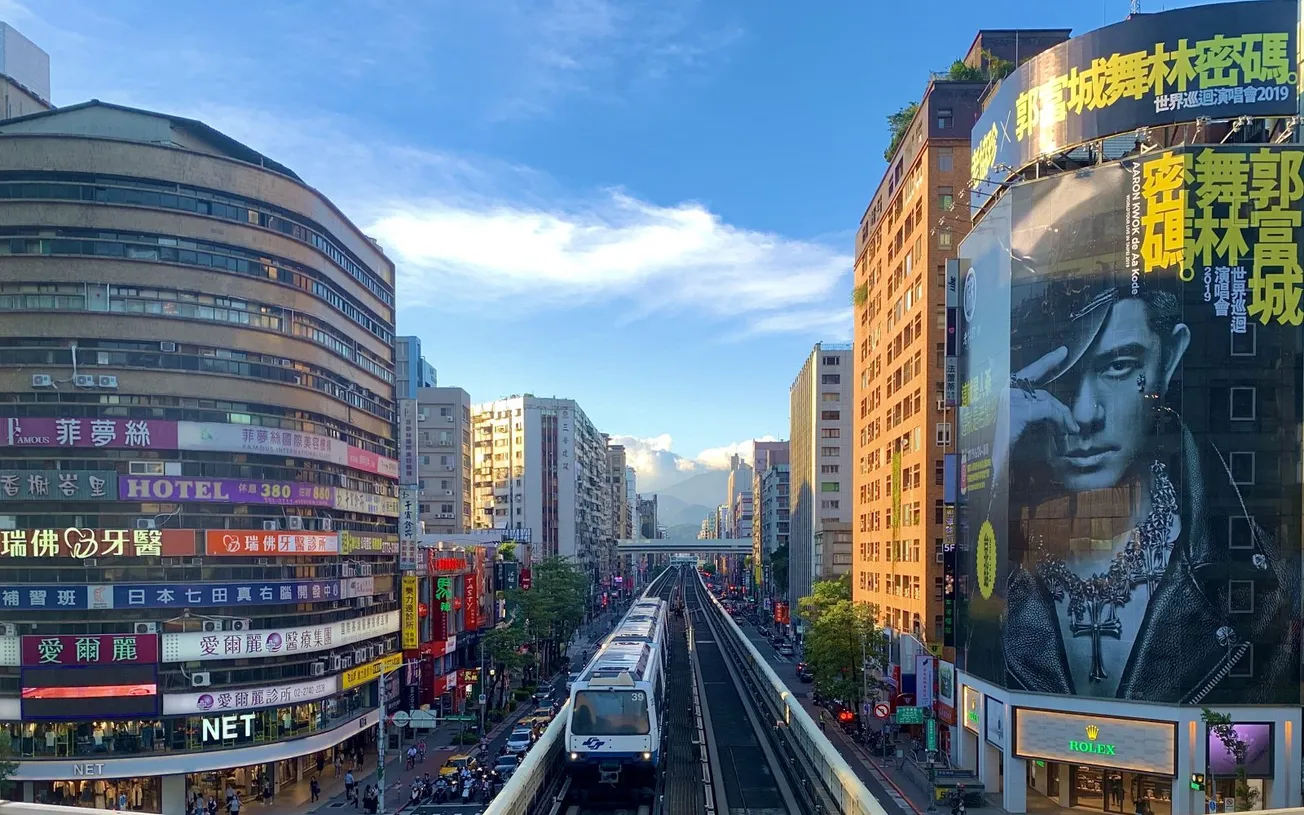Table of Contents
Taiwan has had a challenging history. Having been colonised by the Dutch and Spanish the island nation, located 81 miles off the coast of China, was ruled by the Chinese Fujian province under the Qing dynasty until sovereignty was ceded to Japan in 1895. Following the end of World War II, the nationalist government of the then-Republic of China under the Kuomintang, led by Chiang Kai-shek, took control of Taiwan. In 1949, during the Chinese Civil War, the Republic of China government lost control of the mainland and withdrew to Taiwan. The rival People’s Republic of China was established on the mainland under the Chinese Communist Party.
Managed as a single-party state by the Republic of China government for 40 years, democracy broke out in Taiwan the 1980s and the first direct presidential election was held in 1996. Home to 23 million people, Taiwan is now fiercely democratic and maintains a spirited sense of independence. This is the potted history of how the Republic of China came to be established in Taiwan, and the reason for its anxiety towards its neighbour, the much larger People’s Republic of China – which does not recognise it as a state and wishes to annex it.
Taiwan has proved a stellar performer at handling the COVID-19 situation. It’s absolutely at the top of the class. The Telegraph reported on 6 March that despite its proximity to China, its interconnectedness, and the fact that 800,000 of its citizens live there, Taiwan had only 44 “isolated” cases of Covid-19. At the time of writing Taiwan has had only 379 cases and 5 deaths.
“Taiwan sets [the] gold standard on epidemic response to keep infection rates low. Early intervention, a clear command structure and transparent communication with the public have helped control the spread of the virus.”
What can we learn from this?
- Never trust China
“By late December,” says Nicola Smith in The Telegraph, “before the coronavirus was on the world’s radar, Taiwan’s government was already sensing danger from rumours of a new respiratory disease emerging from Wuhan.”
Not reports, not official confirmation, but rumours. The Taiwan government does not trust China one bit and monitors its neighbour very closely and with a heightened sense of skepticism. Taiwanese officials began boarding planes and checking the health of travellers the minute they had doubts.
“Taipei began to block flights from China and quarantine people from infected zones before other Asian capitals chose to do so, and Taiwan’s Centres for Disease Control issue daily updates and regular warnings about the locations infected Covid-19 patients visited before their diagnosis.”
2. Membership of the United Nations is not necessarily a good thing
Taiwan is not a member state of the United Nations. The UN website informs us that Taiwan was never kicked out, but rather that the People’s Republic of China delegation was accepted in place of the Taiwan delegation in 1971 – an outcome China aggressively pursued under its One China policy. Taiwan is only recognised as a state by 14 relatively minor nations plus the Vatican. To our shame no major country in the Anglosphere recognises it, preferring instead to appease the Chinese dragon.
Because it isn’t a member of the UN, Taiwan is also excluded from the World Health Organisation and so didn’t receive The Manual on how to deal with the COVID-19 “crisis”. Instead, it has trusted in its own experts and formulated its own robust game plan.
“Public buildings including schools, malls and office blocks require anyone entering to disinfect their hands, and the government quickly averted panic over a face mask shortage with rationing an official stockpile of 44 million masks that ensured a steady flow to the public.”
“The establishment of the national health command centre was really critical. It’s like a little compound where all the information comes from local and central government and it all gets integrated. You get the data, process it and then you can tell people what’s going on.”
The UN, as most of us know, is an insidious supra-national organisation dedicated to destroying international borders and enslaving the governments of sovereign nation-states beneath an overarching Marxist and Islamist agenda – slowly rolled out as Mandates. The UN has not in any meaningful way represented the interests of the civilised Western world since the 1960s. The thousands of people who work there all look and sound like Helen Clark. New Zealand unflinchingly accepts and implements most mandates regardless of which party is in power, and feels extremely virtuous about it.
The head of the WHO is Tedros Adhanom, a former Ethiopian government minister who served under Meles Zenawi in the Ethiopian People’s Revolutionary Democratic Front, a political party describing itself as having a Marxist-Leninist ideology based on “ethnic federalism”. Prior to 1991, the party’s politics were described as “far-left”, and since that time as “centre-left to left” – perhaps because the world has shifted so far left that “left” now means “centre”.
Tedros is described by many news organisations as having a close relationship with Bill and Hillary Clinton and with the Clinton Foundation, and with Bill and Melinda Gates and the Gates Foundation. The same Bill Gates who is looking into a “cure” for the virus.
Not surprisingly, Tedros’ and the WHO’s handling of COVID-19 has been criticised by those who see the organisation as being in bed with China. Their politics align perfectly. President Trump is considering suspending US funding to the WHO.
“They missed the call. They could have called it months earlier. They would have known, and they should have known, and they probably did know,” said Trump (The Hill).
“We’re going to be looking into that very carefully, and we’re going to put a hold on money spent to the WHO,” Trump continued. “We’re going to put a very powerful hold on it, and we’re going to see. It’s a great thing if it works, but when they call every shot wrong, that’s not good.”
Who is calling the shots at the WHO? When Miss Ardern received her coronavirus instruction manual she either didn’t ask that question or, if she did, the answer suited her.
3. Pandemics are common – be prepared
In the past 25 years we have had SARS, MERS, Ebola and Zika virus amongst others. All had the potential to be globally devastating, and were devastating to the populations exposed to them. Taiwan learned from SARS.
“’After Sars, they were already preparing for the next [epidemic],’ Jason Wang, an associate professor of pediatrics at Stanford Medicine in California, told The Telegraph. ‘You want governments to do stuff before you know it’s happening.’”
East Asian countries have all suffered recently from pandemics and remain poised to handle the next one.
“The American Medical Association this week […] praised Taiwan’s response, highlighting its use of big data, new technology and pro-active testing of patients with severe respiratory difficulties.”
4. Control your borders
Left-wing globalists yearn for a world without borders and our government is no exception. New Zealand’s borders are exceptionally easy to control yet not as porous as Miss Ardern would like, especially for the families of refugees and globe-trotting ethnic minorities. Closing our airports left her in a flap. Taiwan beat COVID-19 by acting decisively to close its borders.
“Taiwan combined tight border control from the air and sea with swift identification and quarantine of suspicious cases. National health and immigration information was integrated to track individuals at high risk because of recent travel to affected areas and their home quarantine was monitored through their phones.”
A hotline was set up in each major Taiwanese city for citizens to report their own suspicious symptoms. Note: not to report the symptoms of others, or to dob other people in.
Taiwan went fast and went early, and what it did yielded results. The Taiwanese value their liberty and their democracy, place a high level of emphasis on personal responsibility, and are united in their national cause. Unlike us they are not in lockdown.
Crazy to think that an island nation 81 miles from China can survive the Chinese virus, while an island nation nearly 7000 miles from China appears to be floundering if not sunk.
If you enjoyed this BFD article please consider sharing it with your friends.









